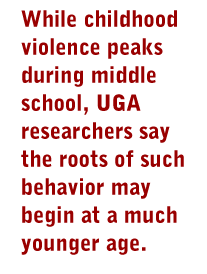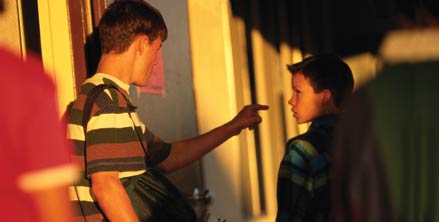


School Kids
Behaving Badly
by Jennifer T. Daly
Intro/The GREAT Program
| Helping teachers act early

Assessing School Kids' Behavior

Intro
School shootings have raised the stakes in understanding and preventing school violence.
For some people, teasing, bullying and name calling are just kids being kids. But even the less-violent forms of aggression can impact kids’ healthy development and learning, according to Arthur Horne. Horne is one of several researchers conducting a national study aimed at reducing aggression and violence in middle schools.
“Our program addresses problems of physical aggression such as hitting, shoving, kicking and biting; verbal aggression such as name calling and teasing; relational aggression such as cliques, exclusion or telling a kid he can’t play with the others; and sexual harassment,” Horne said.
Funded by the Centers for Disease Control and Prevention, the GREAT Schools and Families Program involves teachers, students and parents.

“When we study physical violence in kids, we find that more extreme problems like fighting actually start with less aggressive acts like name calling and teasing,” said Horne, a UGA Distinguished Research Professor of Counseling and Human Development.
The program taps experts from four universities to develop, implement and evaluate a national model for preventing middle school violence. Horne and UGA colleagues — including professors Pamela Orpinas, William Quinn, Roy Martin and Carl Huberty and education program specialist Tracy Elder — have joined forces with researchers at Duke University, the University of Illinois at Chicago, Virginia Commonwealth University and the CDC.
“We are assessing several thousand middle school students, their teachers and well over a thousand families,” Horne said. “The expectation is that if the GREAT program works, the CDC will begin national dissemination.”
While hard, fast conclusions are still about two years away, the researchers have plenty of anecdotal evidence that the GREAT program (Guiding Responsibility and Expectations for Adolescents for Today and Tomorrow) is working.
“Teachers have found it useful in understanding students, and parents report an improvement in family functioning and family-school partnerships,” said Orpinas, a health promotion and behavior professor.
The GREAT Program
At the study’s outset in 1999, researchers from the four universities explored violence
prevention programs offered across the country. After gleaning the best from various programs, they
developed the GREAT program components and began testing them during the project’s second
year. In years three and four, the researchers implemented program components in 6th grade
classrooms in 37 schools in four states: Illinois, North Carolina, Virginia and Georgia. All
schools were assigned to one of four experimental groups: a school-wide approach (GREAT Teacher and
GREAT Student); an approach that targets at-risk students (GREAT Families); a combination of both
approaches; or a control group that received no intervention.
The GREAT Teacher component emphasizes the program’s solution-focused tools and provides
training for reducing aggressive behaviors and increasing well-adjusted ones. Strategies include
alternative ways to set up classrooms, head off problems, defuse conflicts, reduce bullying
and improve student-teacher relationships.
“We talk about what’s working, what’s not working and what they need help with. It becomes a
teacher support group,” Horne said. “We’ve found that the better the relationships the teachers
have with the students, the less aggression in the classroom.”
The 20-week GREAT Student program helps 6th graders develop skills for conflict resolution,
anger management and goal setting. Students also practice solving problems, asking for help and
making basic decisions for today and tomorrow.
“Great decisions for today might be how you just walk on by when you are being teased,” Horne
said. “Great decisions for tomorrow include how you make long-term plans for your life so that
you have a goal that helps you prevent being caught up in violence.”
The GREAT Families component identifies students who could benefit from additional help outside
of school and works with their families to enhance communication, problem-solving and parenting
skills.
The researchers are now at the data analysis stage, examining the effectiveness of their
intervention strategies.
Intro/The GREAT Program
| Helping teachers act early
For comments or for information please e-mail the editor: jbp@ovpr.uga.edu
To contact the webmaster please email: ovprweb@uga.edu
![]()